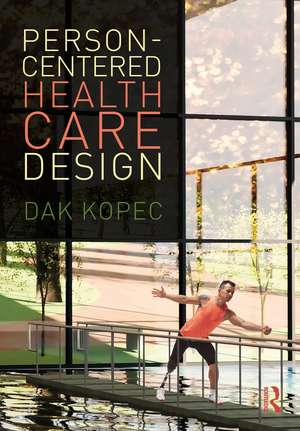Person-Centered Health Care Design
Autor Dak Kopecen Limba Engleză Paperback – 6 mai 2021
Whether the designer has engaged in person- or condition-centered design, this book examines the causes that bring about health conditions, such as autoimmune disorders, chronic lung disease, muscular dystrophy, and neurological disorders, and the effects these have on a person's quality of life. Over forty various health conditions are discussed in relation to assorted building typologies—schools, group homes, rehabilitation and habilitation centers, and more—to identify design solutions for modifying each environment to best accommodate and support a person’s needs.
Dak Kopec encourages readers to think critically and deductively about numerous health conditions and how to best design for them. This book provides students and practitioners a foundational framework that supports the promotion of health, safety, and welfare as they pertain to a person's physiological, psychological, and sociological well-being.
| Toate formatele și edițiile | Preț | Express |
|---|---|---|
| Paperback (1) | 256.96 lei 6-8 săpt. | |
| Taylor & Francis – 6 mai 2021 | 256.96 lei 6-8 săpt. | |
| Hardback (1) | 778.72 lei 6-8 săpt. | |
| Taylor & Francis – 6 mai 2021 | 778.72 lei 6-8 săpt. |
Preț: 256.96 lei
Preț vechi: 301.32 lei
-15% Nou
Puncte Express: 385
Preț estimativ în valută:
49.17€ • 51.34$ • 40.69£
49.17€ • 51.34$ • 40.69£
Carte tipărită la comandă
Livrare economică 04-18 aprilie
Preluare comenzi: 021 569.72.76
Specificații
ISBN-13: 9780367194871
ISBN-10: 0367194872
Pagini: 338
Ilustrații: 296
Dimensiuni: 178 x 254 x 24 mm
Greutate: 0.93 kg
Ediția:1
Editura: Taylor & Francis
Colecția Routledge
Locul publicării:Oxford, United Kingdom
ISBN-10: 0367194872
Pagini: 338
Ilustrații: 296
Dimensiuni: 178 x 254 x 24 mm
Greutate: 0.93 kg
Ediția:1
Editura: Taylor & Francis
Colecția Routledge
Locul publicării:Oxford, United Kingdom
Cuprins
1. Introducing the Health Care Designer; 2. Evolving Beliefs, Lifestyles, and Diseases; 3. Body Insults; 4. Muscular Disorders, Joint Deterioration, and Skeletal Dysplasias; 5. Autoimmune Diseases; 6. Allergens and Sensitivity Disorders; 7. Chronic Lung Diseases; 8. Acquired Brain Injuries; 9. Sensory Deficits; 10. Cognitive Disabilities; 11. Neurological Disorders; 12. Dementias; 13. Post-Traumatic Stress and Mood Disorders; 14. Psychosis and Neurosis
Notă biografică
Dak Kopec is an associate professor in the School of Architecture at the University of Nevada, Las Vegas. Dak has authored several books used by interior design educators, including three editions of Environmental Psychology for Design. He is a two-time Polsky Prize winner, is credited with researching, developing, and administering the first low-residency graduate program focused on designs for human health at the Boston Architectural College, and has been awarded honorary Fellowship to ASID (Hon.FASID).
Dak served as a visiting professor at the University of Hawaii with a joint position in architecture and medicine, was listed as a Fulbright Specialist, and subsequently served two terms as a Fulbright Reviewer. In 2017, Dak won IDEC’s Community Service Award for the design of a group home for people with developmental disabilities and early-onset dementia. Today, Dak is calling upon his diverse educational background in health sciences, psychology, and architecture to promote interdisciplinary and person-centered design.
Dak served as a visiting professor at the University of Hawaii with a joint position in architecture and medicine, was listed as a Fulbright Specialist, and subsequently served two terms as a Fulbright Reviewer. In 2017, Dak won IDEC’s Community Service Award for the design of a group home for people with developmental disabilities and early-onset dementia. Today, Dak is calling upon his diverse educational background in health sciences, psychology, and architecture to promote interdisciplinary and person-centered design.
Recenzii
"Environmental design approaches promoting human-centric solutions engender spaces to improve quality of life. Bridging medical and environmental design, Person-Centered Health Care Design introduces a specialty where designers develop knowledge of anatomy, physiology, and disease pathology vis-a-vis designed environments. The book’s coverage of design’s intersections with health offers a significant foundation across various scales. The book presents crosscutting knowledge to designers focused on preventing health conditions, aiding in rehabilitation, or assisting those with altered capacities due to health conditions, and suggests processes for those expanding their professional skills." Dr. Lynne M. Dearborn, AIA, Professor of Architecture, University of Illinois at Urbana-Champaign
"Person-Centered Health Care Design attends to the necessary point that people vary and healthcare conditions are diverse and that wellness involves physical, psychological, emotional health. It follows that healthcare environment solutions must acknowledge and strategically nurture patients where they are in their healing or health management process. Now more than ever, thoughtful, attendant environments are a prescription for people just as drug and therapy regimens are. Person-Centered Health Care Design importantly links medical conditions with built environment interventions that can lend important support to people in a time of great need." Jill Pable, Ph.D., FIDEC, NCIDQ, WELL AP
"Person-Centered Health Care Design attends to the necessary point that people vary and healthcare conditions are diverse and that wellness involves physical, psychological, emotional health. It follows that healthcare environment solutions must acknowledge and strategically nurture patients where they are in their healing or health management process. Now more than ever, thoughtful, attendant environments are a prescription for people just as drug and therapy regimens are. Person-Centered Health Care Design importantly links medical conditions with built environment interventions that can lend important support to people in a time of great need." Jill Pable, Ph.D., FIDEC, NCIDQ, WELL AP
Descriere
This book presents the specialized area of person-centered health care design, which focuses on a person's design needs because of one or more health conditions and requires foundational knowledge pertaining to infection control, bio physiology, neuroscience, and basic biomechanics.
